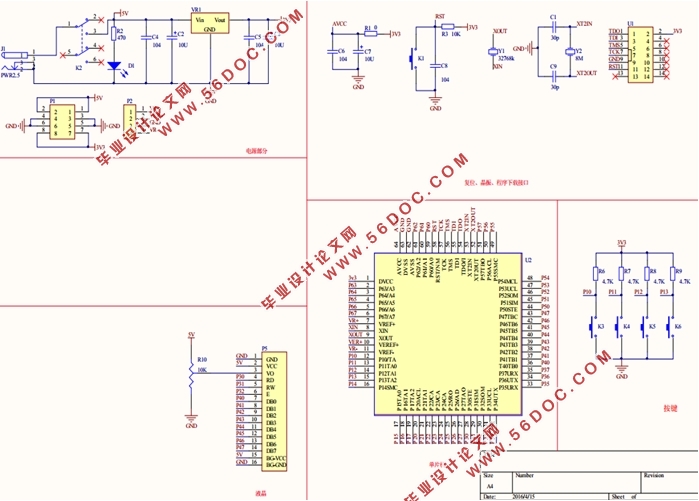基于MSP430单片机的PM2.5测量及空气净化系统的设计
来源:wenku7.com 资料编号:WK717149 资料等级:★★★★★ %E8%B5%84%E6%96%99%E7%BC%96%E5%8F%B7%EF%BC%9AWK717149
以下是资料介绍,如需要完整的请充值下载。
1.无需注册登录,支付后按照提示操作即可获取该资料.
2.资料以网页介绍的为准,下载后不会有水印.资料仅供学习参考之用. 密 保 惠 帮助
资料介绍
基于MSP430单片机的PM2.5测量及空气净化系统的设计(论文11000字)
摘要:PM2.5指的是直径小于2.5μm的的颗粒物,由于其悬浮于空气中,对空气质量和人体健康都有极大危害。因此,对PM2.5的测量与控制刻不容缓。本设计针对PM2.5污染的现状设计了PM2.5浓度监测以及空气净化系统。采用MSP430F149单片机为控制中心,通过夏普GP2Y1010AU0F灰尘传感器采集PM2.5浓度,经AD转换将测量值实时显示在LCD液晶显示器上。通过四位按键来设置系统的报警值,当检测到的PM2.5浓度达到所设定的报警值,通过闭合继电器启动负离子发生器,达到净化空气的效果。同时,考虑到湿度对测量值的影响,本设计进行了一系列的实验并通过神经网络补偿方法来对湿度的影响进行修正。本设计使用功耗低,集成度高的MSP430单片机,便于携带,工作稳定,十分适用于日常生活中的PM2.5检测以及家用空气净化。
关键字:PM2.5;单片机;GP2Y1010AU0F;空气净化;湿度补偿
Design of PM2.5 Content Dectection and Air Purification Based on MSP430
Abstract: PM2.5 refers to the diameter of less than 2.5μm particles, which does great harm to air quality and human health because it’s suspended in the air. Therefore, the measurement and control of PM2.5 is urgent. This paper designs the PM2.5 concentration monitoring and air purification system for the status of PM2.5 pollution. The system uses MSP430F149 microcontroller as the control center and Sharp GP2Y1010AU0F dust sensors for collecting PM2.5 concentrations, and then displays the data on the LCD monitor. We set the alarm value by four key, when the concentration of PM2.5 detected reaches the alarm value, the system close relay to make negative ion generator to purify the air. At the same time, taking the impact of humidity on the measured values into account, we design a series of experiments and use BP neutralral network compensation method to compensate the impact of humidity. The design uses a low-power, highly integrated MSP430 MCU, which is portable, stable and well suited for everyday life as well as home air purifier PM2.5 detector.
Keywords: PM2.5; SCM; GP2Y1010AU0F; air purification; Humidity compensation

目 录
1 绪论 1
1.1 研究的背景及意义 1
1.1.1 PM2.5简介及来源 1
1.1.2 PM2.5的危害 1
1.2 国内外发展现状 1
1.2.1 国外发展现状 1
1.2.2 国内发展现状 2
1.3 本设计主要内容 3
1.4 设计主要工作安排 3
2 硬件电路设计 5
2.1设计的总体框架 5
2.2 硬件电路的总体设计 5
2.3 单片机模块说明 6
2.3.1 单片机的选择 6
2.3.2 电源电路设计 7
2.3.3 复位电路设计 7
2.4 LCD1602液晶显示模块 8
2.4.1 LCD1602工作原理 8
2.4.2 LCD1602的引脚说明及读写控制时序表 8
2.5 夏普粉尘传感器GP2Y1010AU0F 9
2.5.1 GP2Y1010AU0F传感器的技术参数 9
2.5.2 GP2Y1010AU0F传感器的内部结构 10
2.5.3 GP2Y1010AU0F驱动条件 10
2.5.4 GP2Y1010AU0F传感器的工作特性 10
2.6 按键电路 11
2.7 空气净化功能的实现 12
2.7.1 负离子发生器 12
2.7.2 继电器工作原理 12
3 程序设计及软件应用 14
3.1 软件的开发环境 14
3.2 主程序设计流程 14
3.3 AD采样的实现 15
3.4 系统显示功能的设计 15
3.5 卡尔曼滤波算法 16
3.6 按键电路软件设计 17
4 实验及结果分析 18
4.1 实物的制作与焊接 18
4.2 实验及性能验证 19
4.2.1 实验平台的搭建 19
4.2.2 湿度对PM2.5浓度测量影响验证实验 19
4.2.3 BP神经网络数据融合补偿处理 21
4.3 空气净化的实现 22
5 总结 24
参考文献 25
致谢 26
附录 27
附录1:电路原理图 27
附录2:主要源程序 28
|



